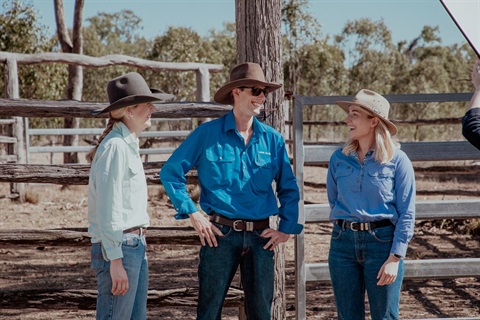 Harvesting honey in PNG Highlands are beekeeping guru Mr Wilson Tomato (L), Dr Cooper Schouten and Mr Paki Billy in partnership with Market Development Facility and Highlands Honey (credit C Schouten)
Harvesting honey in PNG Highlands are beekeeping guru Mr Wilson Tomato (L), Dr Cooper Schouten and Mr Paki Billy in partnership with Market Development Facility and Highlands Honey (credit C Schouten)
Climate change, deforestation, bushfires, tropical cyclones, floods, droughts and now COVID-19* have all had major impacts on beekeepers in the Australia-Pacific region.

Honey hunter Pak Jahuri, 50 m high in a Boan tree, collecting wild forest honey from a colony of Giant Asian Honeybees (Apis dorsata) in West Sumbawa, Indonesia (credit Cooper Schouten).
“Without pollinators, many of our food crops would be significantly affected. Yet beekeeping is often on the periphery of agricultural development priorities,” said Dr Cooper Schouten, Project Manager for the Bees for Sustainable Livelihoods (B4SL) initiative at Southern Cross University, as he celebrates World Bee Day (May 20).
“World Bee Day is not just about honey bees and honey, it’s about recognising the role of all bees as important pollinators and their value in supporting natural ecosystems and communities.”
Finding bees and friends in remote places: Dr Cooper Schouten reflects on how chasing change through beekeeping has simultaneously altered his life and career path in a blog developed with the Crawford Fund.
Recently, more than $250,000 has been raised as part of the Hive Aid campaign to help Australian beekeepers and their honey bees. Corinne Jordan, Vice President of the Australian Queen Bee Breeders Association, is one thankful beekeeper who has taken advantage of this support to cover essential costs to keep her bees and family bee business alive at this difficult time.
Corinne is an Adjunct Research Fellow at Southern Cross University and is leading the bee breeding component of an Australian Centre for International Agricultural Research (ACIAR) funded beekeeping program. This program, led by Associate Professor David Lloyd and Dr Schouten, seeks to increase the productivity, profitability and resilience of smallholder beekeeping enterprises in Papua New Guinea and Fiji.
“Our Bees for Sustainable Livelihoods (B4SL) research group has been working with ACIAR, local and international governments, NGOs and the private sector for the past eight years seeking to understand and improve the mechanisms influencing the successes and failures of beekeeping for development programs among rural farmers,” said Dr Schouten.
Helping our Pacific neighbours benefits Australia too
B4SL’s research has created resources to inform biosecurity policy not only in Fiji, Papua New Guinea and other Pacific Island countries but also Australia. Some significant outcomes are methods for disease detection and best practice smallholder management; for example, the fatal honey bee brood disease American foulbrood (Paenibacillus larvae) in Fiji and honey bee mites (Tropilaelaps mercedesae and Varroa jacobsoni) in Papua New Guinea.
“Not only does the work by B4SL emphasise the value for beekeeping to local and national economies, it provides a pathway to enhance beekeeping research capacity and knowledge for key industry partners to use this information to lobby for the sector,” Dr Schouten said.
“What we are learning about honey bees in places like PNG, Indonesia and Fiji is that beekeeping establishes a viable income source for landholders, feeds into research more generally for understanding and improves outcomes for honey bee biosecurity and conditions to safeguard food security here in Australia.
“Our research and extension seek to provide best practice beekeeping information based on leading applied scientific evidence with the goal of optimising success within beekeeping development programs and achieving sustainable and equitable outcomes for marginalised beekeepers.”
Like bees to the flower, Dr Schouten’s work has attracted the curiosity and interest of both undergraduate and postgraduate students at Southern Cross eager to help improve the lives of farmers and become involved in the agricultural sector, just like when he travelled to Timor Leste with Associate Professor Lloyd as an undergraduate eight years ago.
When asked why he chose bees as a line of work, Dr Schouten replied: “It’s more than just bees and honey. It is about people, it’s about friendships and finding meaning in your work by helping others.
“To quote Dr Seuss, ‘Unless someone like you cares a whole awful lot, nothing is going to get better. It’s not.'”
*COVID-19 has meant beekeepers have been unable to hold conferences where they meet to share vital industry information. In the Pacific region, border closures hit hard Fiji’s tourism industry. Many Fijian beekeepers supply restaurants, hotels and markets with honey and bee products. In addition, local lockdowns meant beekeepers were unable to move their hives before tropical cyclone Harold hit Fiji in April, particularly in the Sigatoka area.







